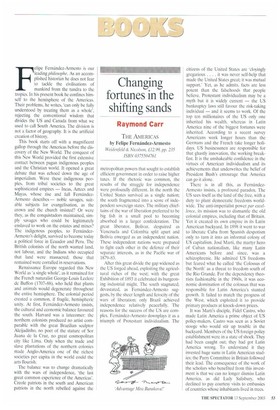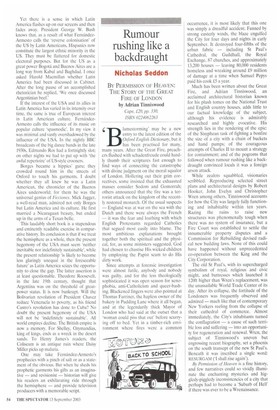Changing fortunes in the shifting sands
Raymond Carr
THE AMERICAS by Felipe Fernandez-Armesto Weidenfeld & Nicolson, £12.99, pp. 235 ISBN 0375504761 Felipe Fernandez-Armesto is our leading philosophe. As an accomplished historian he does not fear to tackle the civilisations of mankind from the tundra to the tropics. In his present book he confines himself to the hemisphere of the Americas. Their problems, he writes, 'can only be fully understood by treating them as a whole', rejecting the conventional wisdom that divides the US and Canada from what we used to call South America. The division is not a factor of geography. It is the artificial creation of history.
This book starts off with a magnificent gallop through the Americas before the discovery of the New World. The conquest of this New World provided the first extensive contact between pagan indigenous peoples and the Christian world. It opened a great debate that was echoed down the age of imperialism. Were these indigenous peoples, from tribal societies to the great sophisticated empires — Incas, Aztecs and Mayas, whose rise and fall FernandezArmesto describes — noble savages, suitable subjects for evangelisation, as the crown and the church insisted? Or were they, as the conquistadors maintained, simply savages who could be legitimately enslaved to work on the estates and mines? The indigenous peoples, to FernandezArmesto's delight, survived to become today a political force in Ecuador and Peru. The British colonists of the north wanted land, not labour, and the Indians who occupied that land were massacred; those that remained were corralled in reservations.
Renaissance Europe regarded this New World as 'a single whole', as it remained for the French naturalist George-Louis Leclerc de Buffon (1707-88), who held that plants and animals would degenerate throughout the entire hemisphere. The colonial period created a common, if fragile, hemispheric unity. At first, Fernandez-Armesto insists, the cultural and economic balance favoured the south. Harvard was a latecomer: the northern colonists produced no artist comparable with the great Brazilian sculptor Aleijadinho, no poet of the stature of Sor Juana de la Cruz, no great cosmopolitan city like Lima. Only when the trade and slave plantations of the northern colonies made Anglo-America one of the richest societies per capita in the world could the arts flourish.
The balance was to change dramatically with the wars of independence, 'the last great common experience of the Americas'. Creole patriots in the south and American patriots in the north rebelled against the metropolitan powers that sought to establish efficient government in order to raise higher taxes. If the rhetoric was common, the results of the struggle for independence were profoundly different. In the north the United States survived as a single nation; the south fragmented into a score of independent sovereign states. The military chieftains of the war of liberation preferred to be big fish in a small pool to becoming absorbed in a larger confederation. The great liberator, Bolivar, despaired as Venezuela and Colombia split apart and Bolivia emerged as an independent nation. These independent nations were prepared to fight each other in the defence of their separate interests, as in the Pacific war of 1879-83.
After this great divide the gap widened as the US forged ahead, exploiting the agricultural riches of the west; with the great Exhibition of 1893 it celebrated its burgeoning industrial might. The south stagnated, devastated, as Fernandez-Armesto suggests, by the sheer length and ferocity of the wars of liberation; only Brazil achieved independence relatively peacefully. The reasons for the success of the US are complex. Fernandez-Armesto downplays it as a triumph of Protestant individualism. The citizens of the United States are 'cloyingly gregarious . . . it was never self-help that made the United States great; it was mutual support.' Yet, as he admits, facts are less potent than the falsehoods that people believe. Protestant individualism may be a myth but it is widely current — the US bankruptcy laws still favour the risk-taking individual — and it seems to work. Of the top ten millionaires of the US only one inherited his wealth, whereas in Latin America nine of the biggest fortunes were inherited. According to a recent survey Americans work longer hours than the Germans and the French take longer holidays. US businessmen are responsible for that ghastly innovation, the working breakfast. It is the unshakeable confidence in the virtues of American individualism and its achievements that underwrites the belief of President Bush's entourage that America can go it alone.
There is in all this, as FernandezArmesto insists, a profound paradox. The US sees itself as the land of the free, with a duty to plant democratic freedoms worldwide. The anti-imperialist power par excellence, its mission was to dismantle the old colonial empires, including that of Britain. Yet it created its own empire in its Latin American backyard. In 1898 it went to war to liberate Cuba from Spanish despotism only to turn it into an informal colony of US capitalism. Jose Marti, the martyr hero of Cuban nationalism, like many Latin Americans before and since, was a schizophrenic. He admired US freedoms but feared what he called 'the Colossus of the North' as a threat to freedom south of the Rio Grande. For the dependency theorists fashionable in the 1960s, it was economic domination of the colossus that was responsible for Latin America's stunted growth. It failed to match the progress of the West, which exploited it to provide primary products at knock-down prices.
It was Marti's disciple, Fidel Castro, who made Latin America a prime object of US policy-makers. Castro was seen as a Soviet stooge who would stir up trouble in the backyard. Members of the US foreign policy establishment were in a state of shock. They had been caught out; they had got Latin America wrong. To understand it they invested huge sums in Latin American studies; the Parry Committee in Britain followed their lead. The consequence of the work of the scholars who benefited from this investment is that we can no longer dismiss Latin America, as did Lady Salisbury, who declined to pay courtesy visits to embassies of countries whose inhabitants lived in trees. Yet there is a sense in which Latin America flashes up on our screens and then fades away. President George W. Bush knows that, as a result of what FernandezArmesto calls the reverse colonisation' of the US by Latin Americans. Hispanics now constitute the largest ethnic minority in the US. They must be flattered for domestic electoral purposes. But for the US as a great power Bogota and Buenos Aires are a long way from Kabul and Baghdad. I once asked Harold Macmillan whether Latin America had been discussed in Cabinet. After the long pause of an accomplished rhetorician he replied, 'We once discussed Argentinian beef.'
If the interest of the USA and its allies in Latin America has varied in its intensity over time, the same is true of European interest in Latin American culture. FernandezArmesto calls the influence of its music on popular culture 'spasmodic'. In my view it was minimal and vastly overshadowed by the influence of the USA. In the nightly BBC broadcasts of the big dance bands in the late 1930s. Edmund° Ros had a fortnightly slot; on other nights we had to put up with 'the awful repertoire' of US-style crooners.
Borges became a hippies' guru; they crowded round him in the streets of Oxford to touch his garments. I doubt whether they all knew he was a Latin American, the chronicler of the Buenos Aires underworld; for them he was the universal genius of Ficciones. Mick Jagger, a well-read man, admired not only Borges but Latin America and its culture. He first married a Nicaraguan beauty, but ended up in the arms of a Texan belle.
This laudably short book is a stupendous and eminently readable exercise in comparative history. Its conclusion is that if we treat the hemisphere as a whole, then the present hegemony of the USA must seem 'neither inevitable nor indefinitely sustainable', while the present relationship 'is likely to become less glaringly unequal in the foreseeable future' as Latin America seizes the opportunity to close the gap. The latter assertion is at least questionable. Theodore Roosevelt, in the late 19th century, thought that Argentina was on the threshold of greatpower status. It is now bankrupt. Will the Bolivarian revolution of President Chavez reduce Venezuela to poverty, as his friend Castro's revolution has done to Cuba? No doubt the present hegemony of the USA will not be 'indefinitely sustainable'. All world empires decline. The British empire is now a memory. For Shelley, Ozymandias, king of kings, ends as a wreck in the desert sands. To Henry James's readers, the Coliseum is an antique ruin where Daisy Miller picks up malaria.
One may take Fernandez-Armesto's prophecies with a pinch of salt or as a statement of the obvious. But when he sheds his prophetic garments his gifts as an imaginative — and revisionist — historian will give his readers an exhilarating ride through the hemisphere — and provide television producers with a memorable script.



























































































 Previous page
Previous page